


Preferred language

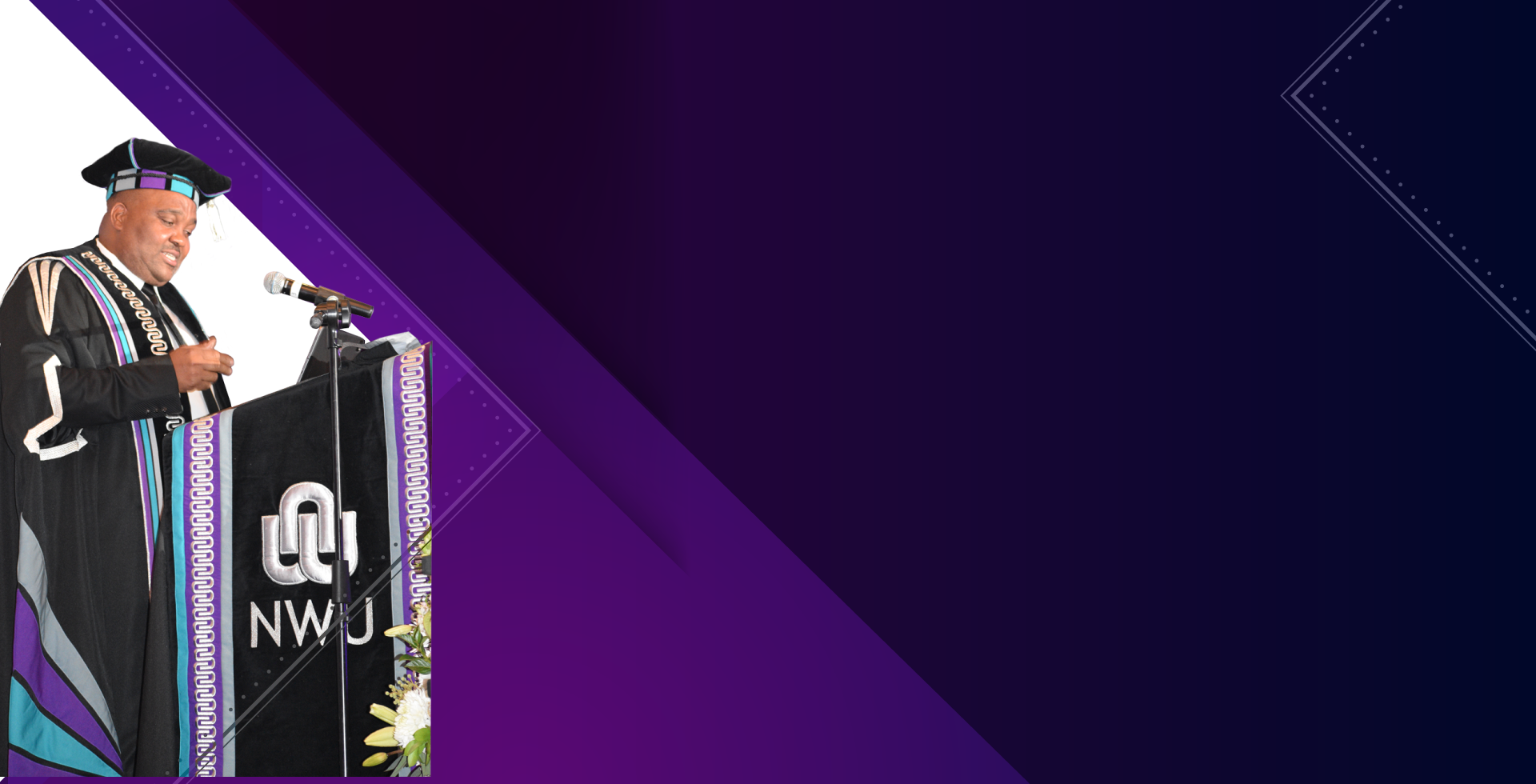


Inauguration
of VC heralds exciting new era
The inauguration of Dr Bismark Tyobeka as the third vice-chancellor of the NWU is the start of an exciting new journey for the university.
Dr Bismark Tyobeka is the NWU’s newly inaugurated principal and vice-chancellor.
– Willie du Plessis –


Dr Tyobeka, who started his five-year term as principal and vice-chancellor on 1 June 2022, was officially inaugurated on 26 August during a prestigious event at the Feather Hill Hotel and Venue in Potchefstroom.
He says the inauguration marks the start of a journey that will be characterised by the consolidation of the NWU’s successes and the repositioning of the university to explore new frontiers and opportunities – nationally and internationally.
We can achieve even more
Dr Tyobeka says that since the inception of the NWU, the university has lived up to the demands and expectations of its stakeholders.
“However, we can do more. We are poised to achieve even more and to continue to play a key role in finding solutions for societal problems to unlock opportunities for our stakeholders.”
Focus on key issues
Dr Tyobeka says the focus in the medium to long term will be on a few key issues. These include the establishment of medical and veterinary schools and exploring the feasibility of a school of mines and mining engineering.
The NWU will also place emphasis on internationalisation and Africanisation, the decolonisation of the curriculum and collaboration initiatives towards improving food security within North West.
Plans to raise funds for missing middle and postgraduate students will also receive attention as a means to intensify the NWU’s contribution towards building a knowledge economy.
Other focus areas are increasing graduate employability and entrepreneurship development, and ensuring the sustained impact of the NWU’s research and community engagement programmes.
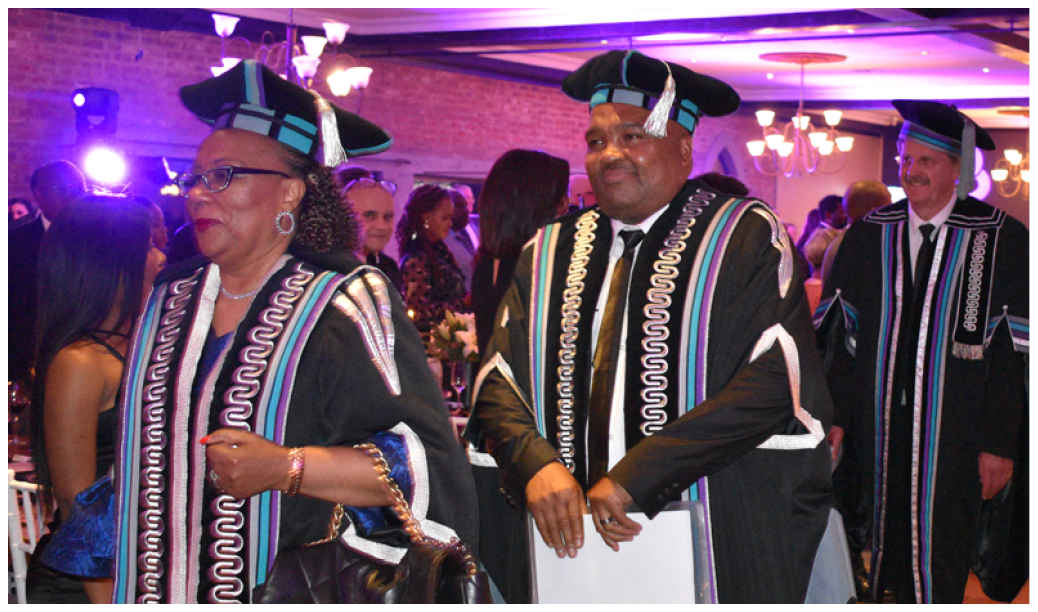
The academic procession leaves the hall after the inauguration of Dr Tyobeka. In front is NWU Chancellor Dr Anna Mokgokong, followed by the newly inaugurated principal and vice-chancellor, Dr Bismark Tyobeka, and Council chairperson, Bert Sorgdrager.

Develop indigenous languages
Dr Tyobeka was inaugurated as vice-chancellor by Prof Marlene Verhoef, registrar of the NWU.
During his inauguration, Dr Bismark Tyobeka said the university will focus on the development of indigenous languages.
The NWU will invest more funding in developing Setswana, Sesotho and isiZulu to the level of maturity as languages of instruction, he said.
“The NWU remains a niche destination for Afrikaans-speaking students who seek quality education in their mother tongue – probably the last remaining destination of its kind.”
Dr Tyobeka pointed out that while others may view this as a threat and an aberration of the university’s transformation efforts, the NWU views it as an opportunity to demonstrate that transformation does not equal the extinction of indigenous South African languages, of which Afrikaans is one.
“Our transformation and decolonisation efforts must use the Afrikaans language as a benchmark to prop up other languages. This is possible as long as we do not use any of these languages, Afrikaans included, as barriers to access and inclusion.”
He said the language policy that the NWU adopted a few years ago during his tenure as chairperson of Council clearly sets out how the NWU’s use of functional multilingualism should enable access and inclusion, instead of impeding it.

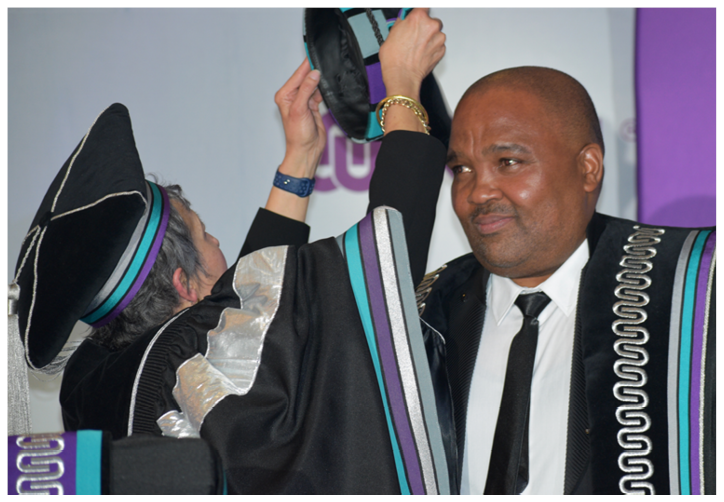
Click here to read more about this prestigious event.




Inauguration
of VC heralds exciting new era
The inauguration of Dr Bismark Tyobeka as the third vice-chancellor of the NWU is the start of an exciting new journey for the university.
Dr Bismark Tyobeka is the NWU’s newly inaugurated principal and vice-chancellor.
– Willie du Plessis –
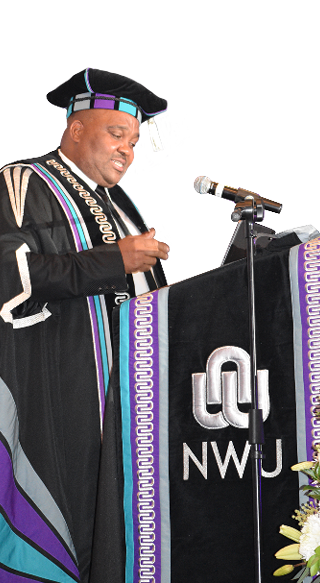



Dr Tyobeka, who started his five-year term as principal and vice-chancellor on 1 June 2022, was officially inaugurated on 26 August during a prestigious event at the Feather Hill Hotel and Venue in Potchefstroom.
He says the inauguration marks the start of a journey that will be characterised by the consolidation of the NWU’s successes and the repositioning of the university to explore new frontiers and opportunities – nationally and internationally.
We can achieve even more
Dr Tyobeka says that since the inception of the NWU, the university has lived up to the demands and expectations of its stakeholders.
“However, we can do more. We are poised to achieve even more and to continue to play a key role in finding solutions for societal problems to unlock opportunities for our stakeholders.”
Focus on key issues
Dr Tyobeka says the focus in the medium to long term will be on a few key issues. These include the establishment of medical and veterinary schools and exploring the feasibility of a school of mines and mining engineering.
The NWU will also place emphasis on internationalisation and Africanisation, the decolonisation of the curriculum and collaboration initiatives towards improving food security within North West.
Plans to raise funds for missing middle and postgraduate students will also receive attention as a means to intensify the NWU’s contribution towards building a knowledge economy.
Other focus areas are increasing graduate employability and entrepreneurship development, and ensuring the sustained impact of the NWU’s research and community engagement programmes.
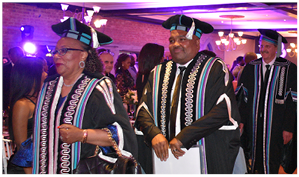
The academic procession leaves the hall after the inauguration of Dr Tyobeka. In front is NWU Chancellor Dr Anna Mokgokong, followed by the newly inaugurated principal and vice-chancellor, Dr Bismark Tyobeka, and Council chairperson, Bert Sorgdrager.

Develop indigenous languages
Dr Tyobeka was inaugurated as vice-chancellor by Prof Marlene Verhoef, registrar of the NWU.
During his inauguration, Dr Bismark Tyobeka said the university will focus on the development of indigenous languages.
The NWU will invest more funding in developing Setswana, Sesotho and isiZulu to the level of maturity as languages of instruction, he said.
“The NWU remains a niche destination for Afrikaans-speaking students who seek quality education in their mother tongue – probably the last remaining destination of its kind.”
Dr Tyobeka pointed out that while others may view this as a threat and an aberration of the university’s transformation efforts, the NWU views it as an opportunity to demonstrate that transformation does not equal the extinction of indigenous South African languages, of which Afrikaans is one.
“Our transformation and decolonisation efforts must use the Afrikaans language as a benchmark to prop up other languages. This is possible as long as we do not use any of these languages, Afrikaans included, as barriers to access and inclusion.”
He said the language policy that the NWU adopted a few years ago during his tenure as chairperson of Council clearly sets out how the NWU’s use of functional multilingualism should enable access and inclusion, instead of impeding it.

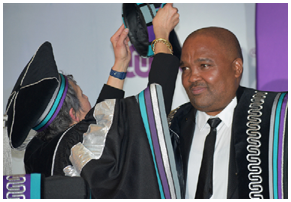
Click here to read more about this prestigious event.
